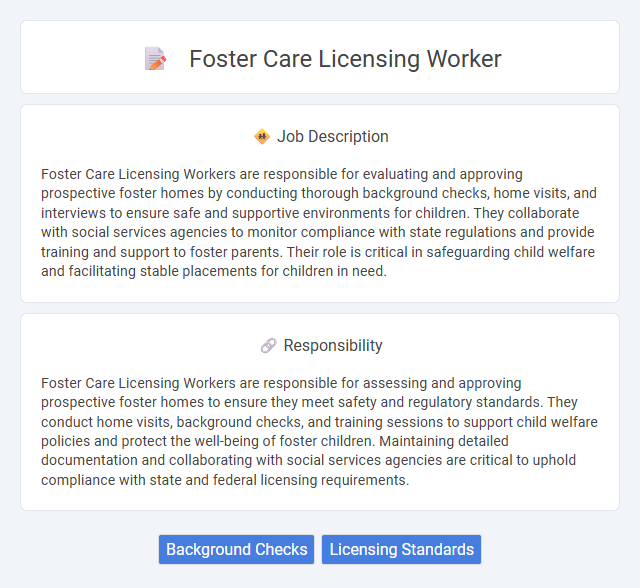
Foster Care Licensing Workers are responsible for evaluating and approving prospective foster homes by conducting thorough background checks, home visits, and interviews to ensure safe and supportive environments for children. They collaborate with social services agencies to monitor compliance with state regulations and provide training and support to foster parents. Their role is critical in safeguarding child welfare and facilitating stable placements for children in need.
Individuals with strong interpersonal skills, emotional resilience, and a genuine commitment to child welfare are likely to be suitable for a Foster Care Licensing Worker role. Those experiencing high levels of stress or lacking empathy may find the job challenging due to the sensitive nature of assessing family environments. A background in social work or related fields could increase the probability of success in managing the responsibilities effectively.
Qualification
A Foster Care Licensing Worker must possess a bachelor's degree in social work, psychology, or a related human services field, along with relevant state licensure or certification. Experience in child welfare, family services, or case management is essential, typically requiring at least two years of direct service involvement with children and families. Strong knowledge of foster care regulations, home inspection procedures, and child safety standards is critical for ensuring compliance and promoting child well-being.
Responsibility
Foster Care Licensing Workers are responsible for assessing and approving prospective foster homes to ensure they meet safety and regulatory standards. They conduct home visits, background checks, and training sessions to support child welfare policies and protect the well-being of foster children. Maintaining detailed documentation and collaborating with social services agencies are critical to uphold compliance with state and federal licensing requirements.
Benefit
Foster Care Licensing Workers likely experience significant job satisfaction from helping vulnerable children find safe, supportive homes. The role may offer stable employment with benefits such as health insurance and retirement plans. Opportunities for professional growth and training in social services are also probable advantages.
Challenge
A Foster Care Licensing Worker likely faces the challenge of balancing compliance with state regulations while ensuring the well-being and safety of children placed in foster homes. The role probably involves managing extensive documentation and conducting thorough home assessments under tight timelines. High emotional demands and case complexity may contribute to consistent pressure in maintaining quality standards.
Career Advancement
Foster Care Licensing Workers gain crucial experience in child welfare regulations and family assessment, positioning themselves for advancement to roles such as Child Protective Services Supervisor or Social Services Program Manager. Developing expertise in licensing standards, compliance monitoring, and foster parent support enhances opportunities for leadership and specialized certifications. Continuous professional development and advanced degrees in social work or public administration further accelerate career growth within state or nonprofit child welfare agencies.
Key Terms
Background Checks
Foster Care Licensing Workers conduct thorough background checks to ensure the safety and well-being of children placed in foster homes. These checks include reviewing criminal records, child abuse registries, and household member screenings to verify suitability and compliance with state regulations. Accurate background investigations are critical to maintaining high standards in foster care placement and protecting vulnerable children.
Licensing Standards
Foster Care Licensing Workers ensure compliance with state and federal licensing standards by conducting thorough home evaluations and background checks. They monitor foster homes to verify adherence to health, safety, and child welfare regulations critical for maintaining licensure. Their role includes educating prospective foster families on licensing requirements to support optimal care environments.
 kuljobs.com
kuljobs.com